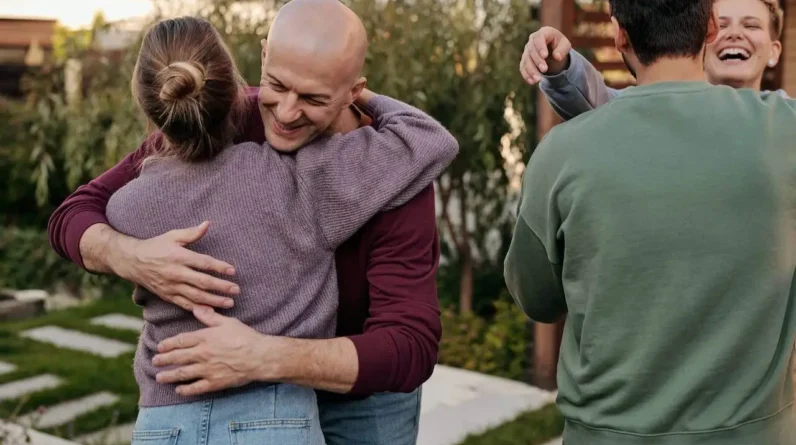
Depression is a mental illness that affects millions of people worldwide.
While there are various treatments available, researchers have discovered something you can do to help minimize symptoms – hugs!
Yes, that’s right – hugging can help improve mood and reduce anxiety and stress levels.
Surprised? Well, studies have shown that hugging stimulates the release of oxytocin, a hormone associated with feelings of happiness and bonding. Experts suggest that regular hugs can help combat the feelings of loneliness and isolation that often accompany depression.
The Science Behind Hugs and Mood Regulation
Hugs have always been known to make us feel good, but is there actual science behind it?
Studies have shown that hugging releases oxytocin, also known as the “love hormone,” which can help regulate our mood and decrease stress levels. This powerful hormone is also responsible for building trust and social bonding, making hugs an essential part of human connection.
Hugs also trigger the release of serotonin, a neurotransmitter that is associated with feelings of happiness and well-being.
Serotonin plays a crucial role in regulating mood, appetite, and sleep, and is often referred to as the “feel-good” neurotransmitter. When we hug someone, our serotonin levels increase, which can lead to a reduction in stress and anxiety.
Moreover, hugs can also increase the levels of dopamine, another neurotransmitter that is associated with pleasure and reward. Dopamine is responsible for creating a sense of motivation and satisfaction, and is often released during activities that bring us joy or pleasure.
Hugging someone can stimulate the release of dopamine in our brain, which can make us feel happier and more satisfied.
In fact, the benefits of hugging are so significant that some experts believe it should be prescribed as a form of therapy.
Hugs have been shown to:
- lower blood pressure
- reduce anxiety and depression
- and even improve our immune system
With so many positive effects, it’s no wonder why hugs are often referred to as “miracle medicine.”
7 Helpful Ways to Communicate with Someone Who Has Depression→
Relevant Studies
A recent study in Brain Sciences (Bruno et al., 2023) tried to find out how hugging, kissing, and positive touch influenced the impact on feelings like depression and stress.
They asked 991 Italian adults (57% female, ages 18 to 85) about how often they hugged, kissed, cuddled, and held hands before and during COVID-19. The study found that during the pandemic, people experienced less positive touch, likely because of lockdowns and social distancing.
Surprisingly, the study showed that more hugs from a partner were linked to fewer symptoms of depression. In simple terms, showing affection through hugs seems to help people feel better, especially during challenging times.
The Emotional Connection: Hugs and the Brain
Touch plays a crucial role in human connection and emotional well-being.
It is through touch that we communicate warmth, love, and support to one another. Whether it’s holding hands, giving a pat on the back, or embracing in a hug, touch has the ability to convey emotions that words often fail to express.
It strengthens our relationships, builds trust, and deepens our connection with others. In fact, studies have shown that regular touch can reduce stress, increase feelings of happiness, and even boost our immune system.
Hugging as a Form of Social Support
Hugs are not just physical gestures; they hold immense social and emotional significance.
When we embrace someone, we are not only providing physical comfort but also offering emotional support. Hugs have the power to uplift our spirits, make us feel loved and cared for, and remind us that we are not alone.
In times of distress or sadness, a simple hug can convey more than words ever could. It shows that someone is there for us, ready to listen and offer solace. The social aspect of hugs is vital in fostering connection and building relationships.
Social connection plays a crucial role in managing and preventing depression. When we feel connected to others, we experience a sense of belonging and support. This feeling helps us combat feelings of isolation, which can often lead to depression.
By maintaining strong social ties, we create a network of people who can offer emotional support and understanding during challenging times. These connections provide a source of comfort, helping us navigate through life’s ups and downs with resilience.
It is helpful to prioritize social connection in our lives, as it acts as a protective barrier against depression and contributes to overall well-being.
Understanding Why You Feel Lonely and 5 Powerful Strategies to Combat It→
Hugs in Therapy and Mental Health Treatment
Hug therapy, also known as hugging therapy or cuddle therapy, is a therapeutic approach that involves the application of healing touch through hugs and physical contact. It has gained popularity as a complementary treatment for mental health conditions.
The power of human touch has long been recognized as a way to:
- alleviate stress
- promote relaxation
- enhance emotional well-being
Hug therapy takes these benefits to the next level by providing individuals with a safe and supportive environment to experience the healing power of touch. It can be integrated into mental health treatment plans to help individuals cope with anxiety, depression, and other emotional challenges.
By incorporating hug therapy into their practice, mental health professionals can offer a holistic approach to healing and support their clients in their journey towards improved mental well-being.
Cuddlists, with their specialized training, provide clients with platonic touch that has been scientifically validated to improve well-being. Additionally, this touch can fortify personal boundaries and improve communication skills.
Practical Tips for Increasing Hugs in Daily Life
Incorporating more hugs into our daily routines can have a profound impact on our overall well-being.
One simple way to do this is by embracing the power of touch within our relationships. Whether it’s with a partner, family member, or close friend, making a conscious effort to give and receive hugs can strengthen the bond between individuals.
Additionally, we can also seek out opportunities to join groups or engage in activities that involve physical touch, such as dance classes or team sports. These activities not only provide opportunities for connection, but also help us stay active and healthy.
However, not everyone has regular access to physical touch, and it’s important to acknowledge and address this.
For individuals who may not have consistent physical touch in their lives, there are still ways to experience the benefits of touch.
Engaging in self-care practices that involve touch, such as giving oneself a massage or practicing yoga, can help fulfill the need for physical connection.
Seeking out professional services like massage therapy or cuddle therapy can also provide a safe and nurturing space for individuals to receive the physical touch they may be lacking.
Ultimately, incorporating more hugs into our daily routines and finding ways to fulfill the need for physical touch can greatly enhance our well-being.
By prioritizing these practices and seeking out opportunities for connection, we can create a more loving and nurturing environment for ourselves and those around us.
Remember, everyone deserves the healing power of touch, so let’s make an effort to spread more love and embrace the beauty of physical connection in our lives.
Conclusion
In conclusion, the research on the link between hugs and reduced depressive symptoms highlights the power of human connection and touch.
Numerous studies have shown that receiving hugs can have a positive impact on our mental health, helping to minimize symptoms of depression. This is thought to be due to the release of oxytocin, a hormone associated with bonding and feelings of well-being.
The findings suggest that incorporating more physical affection, such as hugs, into our daily lives can be a simple yet effective strategy for improving our emotional well-being. So, let’s embrace the power of hugs and spread love and positivity to help reduce depressive symptoms.
Editor’s note: This article was originally published Dec 5, 2023 and has been updated to improve reader experience.
Photo by Askar Abayev







